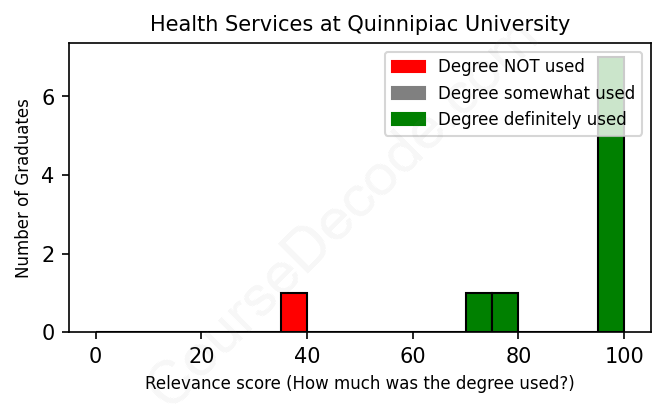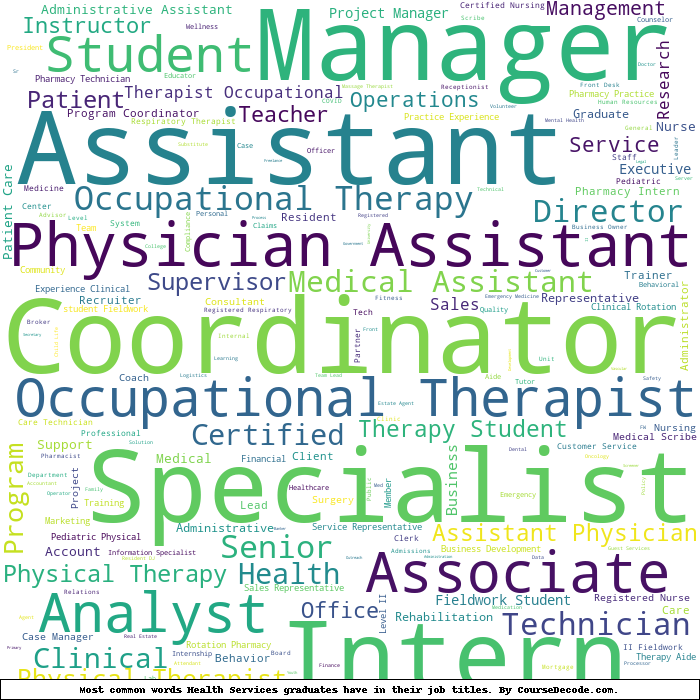
First, some facts. Of the Health Services graduates from Quinnipiac University we've analyzed , here's how many have used (or NOT used) their degree in their career:

These are estimates based on AI analysis of 10 LinkedIn profiles (see below).
The verdict? Great! Overall, with an average relevance score of 88%, Health Services graduates from Quinnipiac University have a substantially higher likelihood (+21%) of finding work in this field compared to the average graduate across all fields:
And for comparison, here's the chart for all profiles we've looked at across all degrees.
Also, after graduating, 60% of these graduates have pursued further education other than another Bachelor's degree (such as a Masters degree or other), compared to the average across all profiles of 35%. This suggests you may need more than just a Bachelors degree to be competitive as a Health Services graduate.
See the details:
|
Relevance score: 100% We think this person has gone into a career highly relevant to their degree. We think this person has gone into a career highly relevant to their degree.
DEGREE INFOGraduated in 2017 from Quinnipiac University with a Bachelor of Health Science in Health Services. Also pursued further education since (see below). JOB HISTORY SINCE GRADUATIONDental Resident Overlook Medical Center Jul 2022 - Jun 2023 Dentist  D'Andrea and Pantera DMD PC Jul 2023 - Apr 2024 Dentist  DR. KURT A. JOHNSON, DMD May 2024 - Present FURTHER DEGREES DONE SINCE GRADUATINGDoctor of Dental Surgery - DDSUniversity of California, San Francisco 2018 - 2022 ABOUTDedicated to Excellence in General Dentistry About Me:With a fervent interest in all aspects of general dentistry, I thrive on the opportunity to create beautiful, healthy smiles and improve the oral health of my patients. My journey in dentistry has been marked by a relentless pursuit of knowledge and skill enhancement, driven by my unwavering passion for the profession. Key Strengths: Patient-Centered Care: I believe in the power of patient education to empower individuals in their oral health journey. By fostering open communication and providing comprehensive information, I ensure my patients feel confident and informed about their treatment options. Pre-Dental Mentorship: As a firm believer in paying it forward, I engaged in mentorship opportunities for aspiring dental professionals at my alma mater. Guiding and supporting future dentists brings me immense joy and fulfillment. Skillset Expansion: Committed to staying at the forefront of advancements in dentistry, I continuously seek opportunities to expand my skillset and integrate the latest techniques and technologies into my practice. I hope to utilize these skills as an opportunity to become a Fellow of the Academy of General Dentistry. Cultural Sensitivity: As a female AAPI doctor trained in the vibrant city of San Francisco, I strive to provide culturally sensitive care to patients by analyzing how patients intersectionality contributes to their overall health. I believe in treating my patients with understanding, respect, compassion, patience, and exceptional attention to their comfort. I strive to create a welcoming and inclusive environment where everyone feels respected and valued. Professional Mission:My mission is to not only provide exceptional dental care, but also to inspire and mentor the next generation of dental professionals. By fostering a culture of continuous learning and empowerment, I aim to make a lasting impact on the field of dentistry and the communities I serve. |
The top 10 most common jobs done by the graduates we've analyzed (ranked most common to least) are:
From my analysis of LinkedIn profiles of Quinnipiac University graduates with Health Services degrees, it seems like a lot of them went on to work in roles that are pretty closely tied to the field. A significant number of graduates became Occupational Therapists, Physical Therapy Aides, and Physical Therapy Technicians, which makes sense since those jobs directly apply what they learned in school about patient care and rehabilitation. For instance, roles like Occupational Therapist and Physical Therapist Assistant are all about using specific health services skills they learned during their studies. So, overall, you can say there's a strong connection between their degrees and the careers they pursued, especially in therapy and rehabilitation settings.
However, it’s interesting to note that not all positions were directly relevant to Health Services. Some grads took on more generic roles, like Customer Service Representative or Practice Manager, which, while they might benefit from some health services knowledge, aren’t strictly focused on health care. There were even cases where graduates worked in fields completely unrelated to their degree, like an Assistant Electrician. So, while the majority of jobs align well with the Health Services background, there is a variety, and a few took different paths that didn’t leverage their specific training. In general though, those who stayed closer to healthcare fields found their education to be incredibly applicable and valuable in their careers!
Here is a visual representation of the most common words in job titles for Health Services graduates (this is across all Health Services graduates we've analyzed, not just those who went to Quinnipiac University):

When looking at the career trajectories of graduates from Quinnipiac University’s Health Services program, it’s clear that many have pursued roles that are quite relevant and beneficial to the health sector. For recent graduates, their first jobs tend to align closely with their academic backgrounds. Many start off as occupational or physical therapy assistants, stepping into roles that provide direct patient care and experience in healthcare settings. For instance, graduates from the class of 2015 and 2021 took on occupational therapy and physical therapy positions shortly after graduation, which is a common path among their peers.
Five to ten years down the road, these graduates often climb up the professional ladder within healthcare. For example, those who began as therapists have transitioned into more advanced roles, such as becoming a director of rehabilitation or pursuing specialized training (like a dentist residency). It’s pretty encouraging to see that many of these folks are still engaged in healthcare, developing their careers in meaningful ways. However, some graduates, particularly from more recent classes, have also ventured into positions that don’t seem strictly related to health services, like customer service or administrative roles. Overall, while there are a few outliers, most graduates are finding success in the health field, making their degrees from Quinnipiac University a solid starting point for a fulfilling career in health services.
Getting a Bachelor’s degree in Health Services at Quinnipiac University can be pretty manageable for most students, especially if you’re organized and stay on top of your coursework. The program tends to cover a lot of foundational topics in health, policy, and administration, so while you’ll definitely have your share of readings and projects, it’s not usually as intense as some science-heavy majors. If you're someone who likes helping others and is interested in the healthcare system, you'll probably find the classes engaging and relatable, which can really make a difference in how hard it feels. Overall, it’s definitely challenging, but it’s not overwhelmingly difficult compared to other degrees, especially if you put in some effort and stay engaged with the material.
Most commonly, in the LinkedIn profiles we've looked at, it takes people 4 years to finish a Bachelor degree in Health Services.
Looking at the job paths of these Quinnipiac University grads, it’s a bit of a mixed bag in terms of money. The graduates, especially those in fields like occupational and physical therapy or management roles, typically have the potential to earn decent salaries, but it seems like some of them are still climbing the ladder in less lucrative positions. For instance, while the occupational therapist who became a director could be raking it in, others just starting out might be earning more like entry-level wages, especially if they’ve bounced around between internships and technician roles. So, if they stick with the more specialized careers, they should see their earnings improve over time, but right now, it looks like the paychecks are pretty varied among them.
Here is a visual representation of the most common words seen in the "about" section of LinkedIn profiles who have a Bachelor degree in Health Services (this is across all Health Services graduates we've analyzed, not just those who went to Quinnipiac University). This may or may not be useful:

Here are all colleges offering a Bachelor degree in Health Services (ordered by the average relevance score of their Health Services graduates, best to worst) where we have analyzed at least 10 of their graduates:
| College | Score | Count |
|---|---|---|
 The Ohio State University The Ohio State University
|
88 | 14 |
 Quinnipiac University Quinnipiac University
|
88 | 10 |
 Grand Valley State University Grand Valley State University
|
87 | 16 |
 University of Tampa University of Tampa
|
87 | 10 |
 Stony Brook University Stony Brook University
|
80 | 15 |
 Boston University Boston University
|
79 | 12 |
 University of Connecticut University of Connecticut
|
78 | 26 |
 Florida Agricultural and Mechanical University Florida Agricultural and Mechanical University
|
76 | 12 |
 Texas A&M University Texas A&M University
|
72 | 16 |
 University of South Florida University of South Florida
|
72 | 26 |
 Boise State University Boise State University
|
71 | 11 |
 University of Central Florida University of Central Florida
|
68 | 47 |
 Florida Gulf Coast University Florida Gulf Coast University
|
68 | 10 |
 James Madison University James Madison University
|
66 | 26 |
 University of Missouri-Columbia University of Missouri-Columbia
|
66 | 17 |
 California State University, Fullerton California State University, Fullerton
|
66 | 13 |
 California State University - East Bay California State University - East Bay
|
66 | 10 |
 Arizona State University Arizona State University
|
62 | 10 |
 Cleveland State University Cleveland State University
|
60 | 10 |
 Stockton University Stockton University
|
58 | 12 |